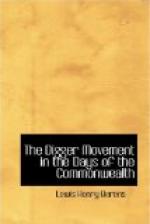Those who have passed through a similar experience, who have been driven from the comparatively comfortable middle-class life to the precarious and comfortless existence of the vast majority of the toiling masses, will readily realise that under such circumstances Winstanley’s mind would naturally be full of questionings such as might not have forced themselves on his attention under more prosperous conditions. What was the aim and object of that incessant struggle out of which he had just emerged “beaten out of both estate and trade”? What made it necessary? who really benefited by it? For whose benefit was the war being waged, the burden of which had fallen so heavily upon him? How was it going to advantage the masses of the people? Was it ever intended that it should benefit them? was it possible that it should do so? Could any such struggle be a means of delivering the great masses of the people, “the younger brothers,” out of the straits of poverty, with its attendant train of ignorance, misery, vice, and crime, to which they had hitherto been ruthlessly and hopelessly condemned? Was it, in truth, inevitable, was it inherent in the very nature of things, was it God’s intention that a privileged few, “the elder brothers,” should be lords and masters, and that the great majority of mankind should for ever remain the mere hewers of wood and drawers of water, the slaves and servants of an insignificant minority of their fellow-creatures? Were these things due to natural causes, to the inscrutable workings of a Divine Providence; or were they but the necessary though unforeseen fruits of mere man-made laws and institutions the existing generation had inherited from a by-gone and ignorant past? Such were the questions which vaguely and indistinctly may have passed, and, as we shall see, did pass, through the active, original, philosophic and deeply religious mind of Winstanley in the quiet solitude of his country life.




